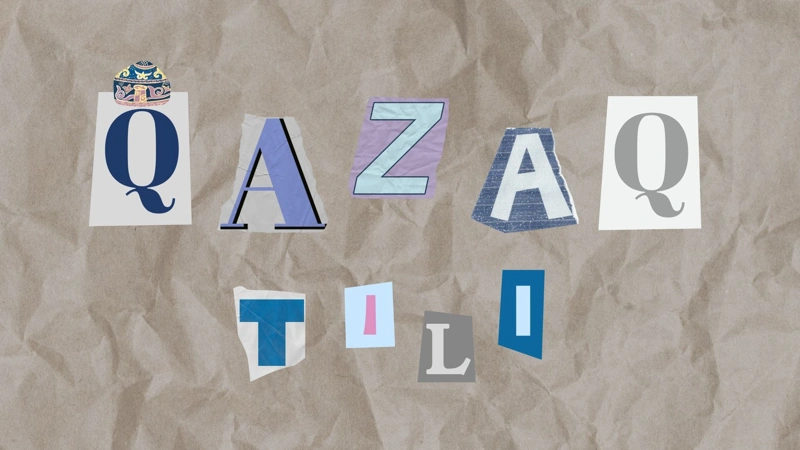So you want to learn Kazakh? Everything you need to know
In this guide, we’ll walk you through everything you need to get started — from the alphabet and the specifics of Kazakh language to finding the best online tools, apps, and ways to practice Kazakh in everyday life, Kazinform News Agency correspondent reports.

History of language
The writing system of Kazakh has changed several times, reflecting the country’s historical and cultural evolution. In the pre-Islamic era, ancient Turkic runes were used. With the spread of Islam, the language adopted the Arabic script, which remained in use until the early twentieth century.
In 1929, the Soviet government introduced the Latin alphabet as part of a campaign to unify Turkic languages, but in 1940 Kazakh was switched to Cyrillic, which remains the official script in Kazakhstan today. Meanwhile, Kazakh communities in China, Iran, Afghanistan, and Pakistan continue to use the Arabic script.
Today, Kazakhstan is in the process of transitioning to a modern version of the Latin alphabet adapted to the phonetic structure of the Kazakh language.
Grammar and structure
Kazakh belongs to the Kipchak branch of the Turkic language family.
Kazakh grammar is agglutinative, meaning that suffixes and endings are added to a root word to modify its meaning. A single word can often express an entire idea.
An interesting detail is that the longest word in Kazakh is qanagattandyrylmagañdyqtaryñyzdan, which contains 33 letters and means "because of your dissatisfaction" when addressed respectfully to several people.
The language has no gender distinctions. Nouns and adjectives do not change according to masculine or feminine forms. The word order also differs from Indo-European languages. The verb almost always comes at the end of the sentence, a pattern typical of many eastern languages.
If you are just beginning to learn Kazakh, the best place to start is with the alphabet.
Since Kazakhstan is moving from Cyrillic to a modern Latin-based script, learners should focus on mastering the new letters and their sounds. Each letter in Kazakh corresponds closely to a single sound, which makes reading and pronunciation straightforward once you understand the system.
For practicing pronunciation of the Kazakh alphabet, you can use videos from the YouTube channel Kazakh Language with Zhannur.
Kazakh pronunciation follows clear and consistent rules. Words are generally pronounced as they are written. Stress usually falls on the final syllable, and vowels follow a system of harmony where front and back vowels do not mix within the same word. This gives the language a melodic and flowing quality.
Knowing Kazakh opens the door to understanding other Turkic languages. With a foundation in Kazakh, learners can often understand elements of Turkish, Azerbaijani, Uzbek, and Kyrgyz, as these languages share many grammatical and lexical features.
Learning can begin online with platforms and applications offering courses from levels A1 to C2.
· Soyle.kz is a government-supported learning platform with interactive lessons, flashcards.
· Tilqural.kz provides structured lessons, films, cartoons, and textbooks along with an integrated dictionary.
· Balatili.kz focuses on mastering the Kazakh alphabet and pronunciation.
· Til Alemi is an extensive online library of educational and linguistic materials.
For self-learners, popular language apps can be helpful:
· Duolingo offers short interactive lessons on grammar and vocabulary for beginners.
· Memrise uses flashcards and native speaker videos to expand vocabulary.
· DuoCards allows offline vocabulary training with flashcards.
· KazLang presents a quest-style learning experience where you acquire new words through storytelling.
· Soz introduces you to interactive story-based lessons, such as meeting an old man on the steppe and responding to his questions.
To immerse yourself in the language, try watching films with subtitles, listening to podcasts or Kazakh music.
We also previously explored the rich and diverse world of Kazakh literature, which reflects the country’s history, philosophy, and spirit:
From folklore to books: The evolution of Kazakh literature
The golden age of Kazakh literature: The 19th century and its great writers
Great writers of Kazakhstan of the early 20th century
Great Kazakh writers of the late 20th century
From the timeless oral epics of nomadic poets to the works of modern authors who bridge tradition and contemporary themes, Kazakh literature offers deep insight into the nation’s cultural identity. It continues to evolve today, blending classic storytelling with new voices that speak to a global audience.
For audio practice, Radio.Garden streams live radio from across Kazakhstan.
More advanced learners can explore Kitap.kz, a digital library containing over six thousand works, including translated world classics and contemporary Kazakh literature. The site also offers audiobooks and recordings of Kazakh composers.
You can also use innovative tools developed by Kazakh researchers. Among them are Oylan 2.5, a multilingual assistant that understands Kazakh, Russian, and English, MangiSoz 2.0, which converts speech to text and translates audio between several languages, and TilSync, which provides real-time video translation with subtitles.
Opportunities for ethnic Kazakhs abroad
The Otandastar Foundation has launched free online Kazakh language courses for ethnic Kazakhs and anyone living abroad who wants to learn or maintain the language.
The program covers levels from A1 to B2 and includes interactive classes, video lessons, and tests. Participants who complete the program receive a certificate. Yet, learning is not limited to online courses. For those living outside Kazakhstan, Kazakh diaspora communities in countries such as Türkiye, Mongolia, China, Russia, Uzbekistan, Europe, and North America remain an important source of language practice.
Even if you are not of Kazakh origin, you can join cultural events hosted by these communities, such as Nauryz celebrations. Such gatherings provide an informal but highly effective environment for practicing Kazakh and experiencing the culture firsthand.
Earlier, Kazinform News Agency reported that French films would be screened in Kazakh language for the first time.
